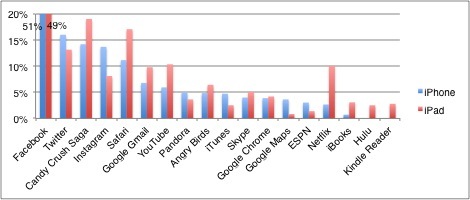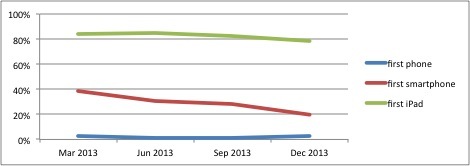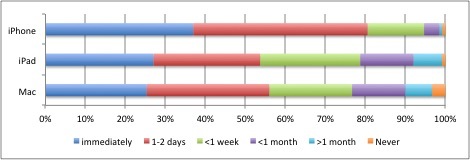How Consumers Buy and Use iPads Affects Its Long-Term Prospects
In his keynote presentation introducing the first iPad in 2010, Steve Jobs alluded to the idea that consumers produce with Mac computers, communicate with iPhones, and consume with iPads. Yet, all three share many applications, and each has some uses in common with the others. It's not clear what sort of device it really is. And, the type of device matters to how it contributes to Apple's results:
Or, as Steve Jobs envisioned, perhaps the iPad is an entirely different type of device, with it's own novel and unique uses. While we can't yet answer these questions definitively, we do have evidence about how buyers use and think about iPads that begins to do that.
We think Apple would prefer the iPad become a big iPhone, with frequent replacement as it makes new models with different features. We suspect, though, based on recent CIRP data about how buyers use them, that it's as much like a Mac, TV, or iPod, with less frequent replacement.
Buyers use iPads in similar ways to how they use iPhones, with respect to email, Internet, and game playing. They also have similar app use patterns. However, buyers tend to use TV-like entertainment apps like Netflix and YouTube more on iPads than on iPhones.
On the other hand, buyers purchase and replace iPads more like TVs. They pass old ones on to family members more than they do iPhones. They also would replace a broken one less quickly than they would a broken iPhone, and about as quickly as they would a broken Mac computer.
We base this analysis on our surveys of Apple product buyers, covering 2,000 subjects that purchased one or more of an iPhone, iPad, or Mac computer in 2013.
Based on app usage, iPad buyers tend more to Internet and entertainment apps relative to iPhone buyers. Facebook dominates use of both devices, with around 50% of both iPad and iPhone buyers reporting that Facebook is one of their three most-used apps.
iPhone and iPad buyers use some other apps differently. iPad users report that YouTube and Netflix are among the three most popular apps much more than iPhone users, which suggests a television experience. Most other apps are used similarly between iPhone and iPad buyers.
Most iPad customers are first-time iPad buyers. In contrast, almost all iPhone buyers already have a mobile phone, and most already have a smartphone. In the past year, the percentage of first-time iPad buyers has trended downward slightly. In contrast, few iPhone buyers purchase their very first phone. And, the percentage of first-time smartphone buyers has also trended downward. We have yet to see the true upgrade pattern for iPads. It is not clear whether first iPads represent a large proportion of iPad buyers because the market continues to grow rapidly, or because the replacement cycle is long.
Consequently, the difference between the iPad and iPhone entails what buyers do with old ones. To a significant extent, customers pass old tablets to friends and family members, while they keep old phones for future use, or sell them.
What Buyers Did With Previous Smartphone and Tablet
Buyers think their iPhones are indispensable. In contrast, they view their iPad a little more like their Mac computer.
For further information, please contact CIRP.



